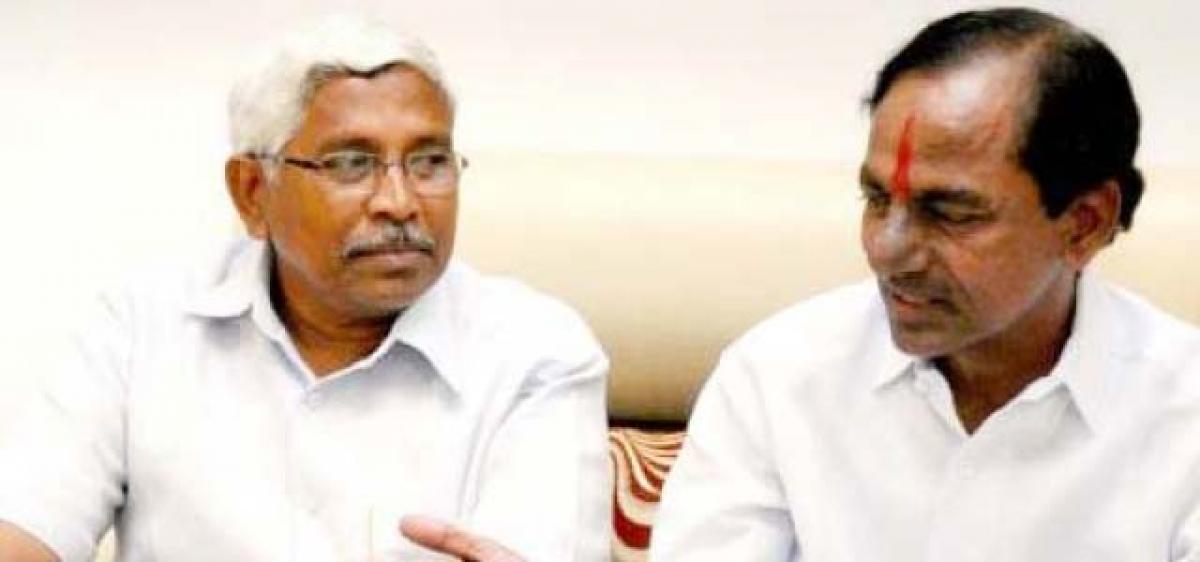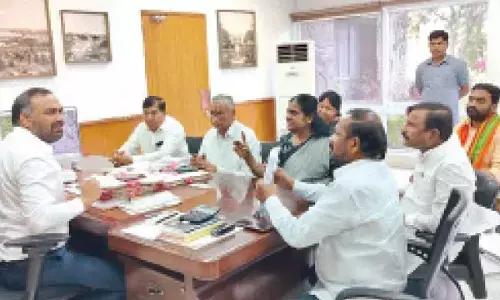Politics of dissent and beyond

‘You made me a communist’ is a Malayalam play of yesteryears. It features a young boy lifted by the police and beaten black and blue. He is accused of being a communist.
Chief Minister K Chandrashekar Rao still enjoys formidable public support. There are no signs of any strong anti-incumbency. Yet, unleashing an onslaught on a civil society movement, even as opposition is not united, will only help in galvanising people’s disenchantment, turning it into a boon for those who want to challenge the establishment
‘You made me a communist’ is a Malayalam play of yesteryears. It features a young boy lifted by the police and beaten black and blue. He is accused of being a communist.
In fact, the innocent youth picked up by the police knows nothing communism. But, after this police treatment, the young man turns into a militant communist activist. The play has a lot to tell the party in power on how it should deal with civil society protests and the opposition unrest.
But, this sense of accommodating diverse opinions and varying protests seems to be lacking in the manner in which the Telangana government reacted to the TJAC stir. Last week in this column, I analysed the constitutional and the legal provisions related to the right to assemble and the power to restrict, and the doctrine of balancing between the two. This week, I primarily deal with the political dimensions of an evolving situation.
The political opposition in Telangana has been active in the recent past and agitating on various issues. But, the opposition protests are obviously not united as the political parties have ideological differences. The TDP and BJP alliance is set apart. The TDP cannot still openly and intensely embrace Congress in its political action, given the fact that the two parties are pitted against each other in the neighbouring state of Andhra Pradesh.
Though the BJP state unit is making occasional noises against the ruling TRS government, clarity still eludes on its political line vis-a-vis the TRS as the central BJP doesn’t yet perceive the TRS as its political foe and the same is equally true with the latter too. It’s still difficult to decode whether pink and saffron are poles apart.
The Congress, the principal opposition in the state cannot in any way join its forces with the BJP as the two continue to be the principal opponents in the national polity. The two national parties cannot chalk out their regional political strategies independent of the national political predicament.
The Left cannot join hands with the BJP which is evident from the fact that even when the Congress and the TDP leadership joined the CPM walkathon, the saffron brigade distanced itself from the red team. Thus, the political opposition to the ruling TRS is splintered and the disunity is unlikely to phase out given these political contours
Precisely here, the TJAC till it forms a political party seems to be a rallying point for all those who are opposed to the KCR regime. Yet, the political parties seem to be cautious in not allowing the initiative to completely go to Prof Kodandaram.
The signs of this situation were in fact evident during the recent TJAC stir. Therefore, contrary to the expectations of the ruling political establishment, which perhaps relied more on the police intelligence than political intelligence, the political parties’ contribution to the TJAC rally (if permitted) would have been symbolic rather than substantial.
But, as the ruling dispensation unleashed an unprecedented onslaught on the protest, the opposition chorus of dissent was its result. Thus, the state action brought about an index of opposition unity rather than dissuading anti-government political forces from joining forces.
In my political analysis, therefore, the government response was not just audacious but politically counterproductive for the ruling party.
In fact, people in power normally become restless when they know that their regime is incurring the wrath of people and the opposition is trying to trigger dissent. But, political landscape in Telangana is not so. Chief Minister K Chandrashekar Rao still enjoys formidable public support. There are no signs of a strong anti-incumbency. No opposition leader still matches the stature and popularity of TRS supremo.
Yet, the opposition parties are committing a terrible mistake in personally targeting a leader who still relishes people’s support. The opposition is doubly wrong in attacking the alleged family rule of KCR as if the dynastic politics began with the TRS and should end with it. Such a personalised attack on a leader who is still popular does not yield any political dividends for the opposition.
An effective strategy for the opposition to revive itself would be to focus on the sections of people alienated from the TRS rule and the issues emanating from people’s disgruntlement with the KCR regime. Meanwhile, beset with such a strategic deficit, the opposition in the state also suffers from lack of a credible leader who can match the charisma of Chief Minister.
Precisely in this context, the TJAC took up the issue of jobs. The issue sinks with the Telangana sentiment as the movement for separate state was centered on the question of jobs along with justice in water and funds issues. But, both the government and the TJAC are only partly correct in their polemics.
The TJAC’s campaign as if the state government has not made any significant move in regard to job recruitment is unrealistic. The government deserves credit for revitalising the Service Commission and initiating the process of recruitment. Yet, the process is tardy and Telangana youth are justifiably angry over the sluggish pace, though the government may have its own reasons.
But, the political leadership, instead of patiently explaining this to those who question the slow pace of recruitment, chose to run a tirade that too against a civil society group which waged the struggle for separate state, fighting shoulder to shoulder with it. Such an aggressive posturing only helps in further consolidating the discontent rather than winning appreciation for the efforts of the government in this regard.
In fact, the political leadership cannot contend with self-congratulatory mood and pretend as if everything is right. Yet, everything is not wrong. In such a situation, the right strategy would be to derive proper feedback from the civil society and media reflections, and attempt mid-course correction rather than brushing aside the civil society’s action as political antagonism. As Amartya Sen observed, the multi-party political system and the free media provide warning signals of an impending problem. Any attempt to choke it would do more harm than good to those in power.
A slew of welfare measures initiated by the KCR government created a positive mood in the electorate as was evident from the resounding success it has received in the last by-elections. Though there were no elections in the recent past, no significant anti-incumbency is discernible. However, there is a sporadic discontent over certain aspects like non-implementation of land for dalits, tardy progress in housing scheme, KG-to-PG free education largely remaining a non-starter, land acquisition, etc. But, this does not pose any immediate political challenge to the ruling dispensation.
The TJAC has both advantages and disadvantages in emerging as a political party. As it spearheaded the movement for separate state, it enjoys the clout. Its leadership is familiar to the people. But, this alone does not sustain a political party.
A large section of TJAC leadership is in it merely because they were not accommodated in the power apparatus and will not hesitate to switch sides if any opportunity lures them. The opposition political space is crowded. It cannot receive the same support from other political parties, which it now enjoys as a civil society group, once it evolves into a political party.
However, it still has a grassroots connect. But, a formidable political organisation is yet to emerge. Even during the movement, TJAC‘s existence was insignificant without the TRS in it.
Any attempt to forcibly stifle the civil society dissent and discontent will only help in galvanising people’s disenchantment, turning it into a boon for those who want to challenge the establishment.

















